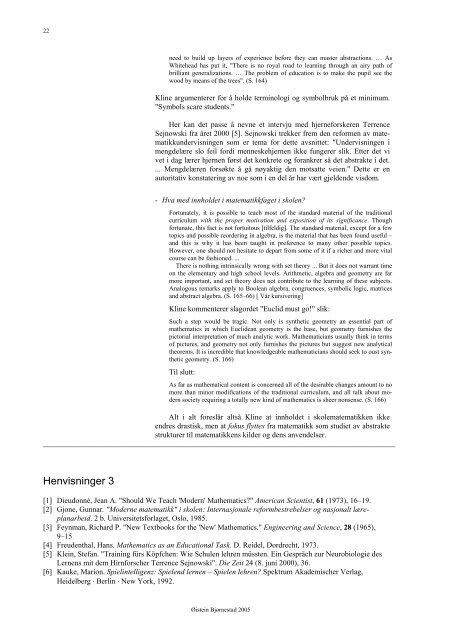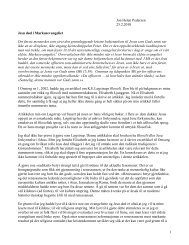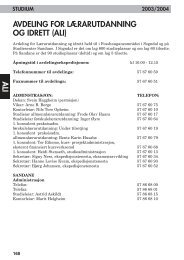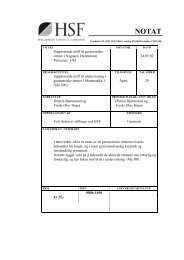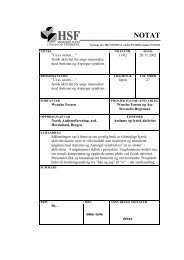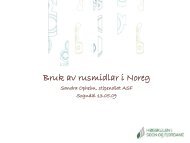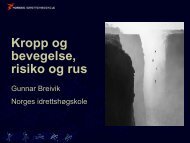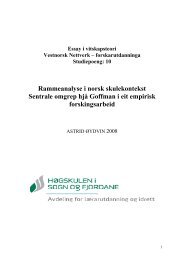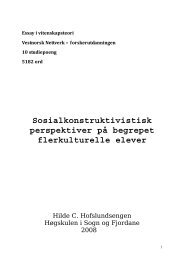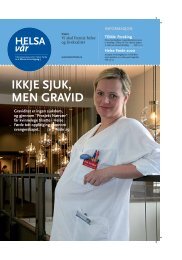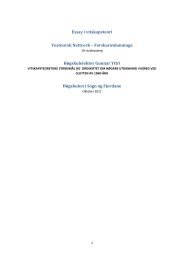Ressursbok i geometri for lærerutdanningen
Ressursbok i geometri for lærerutdanningen
Ressursbok i geometri for lærerutdanningen
You also want an ePaper? Increase the reach of your titles
YUMPU automatically turns print PDFs into web optimized ePapers that Google loves.
22<br />
need to build up layers of experience be<strong>for</strong>e they can master abstractions. … As<br />
Whitehead has put it, "There is no royal road to learning through an airy path of<br />
brilliant generalizations. … The problem of education is to make the pupil see the<br />
wood by means of the trees". (S. 164)<br />
Kline argumenterer <strong>for</strong> å holde terminologi og symbolbruk på et minimum.<br />
"Symbols scare students."<br />
Her kan det passe å nevne et intervju med hjerne<strong>for</strong>skeren Terrence<br />
Sejnowski fra året 2000 [5]. Sejnowski trekker frem den re<strong>for</strong>men av matematikkundervisningen<br />
som er tema <strong>for</strong> dette avsnittet: "Undervisningen i<br />
mengdelære slo feil <strong>for</strong>di menneskehjernen ikke fungerer slik. Etter det vi<br />
vet i dag lærer hjernen først det konkrete og <strong>for</strong>ankrer så det abstrakte i det.<br />
... Mengdelæren <strong>for</strong>søkte å gå nøyaktig den motsatte veien." Dette er en<br />
autoritativ konstatering av noe som i en del år har vært gjeldende visdom.<br />
- Hva med innholdet i matematikkfaget i skolen?<br />
Fortunately, it is possible to teach most of the standard material of the traditional<br />
curriculum with the proper motivation and exposition of its significance. Though<br />
<strong>for</strong>tunate, this fact is not <strong>for</strong>tuitous [tilfeldig]. The standard material, except <strong>for</strong> a few<br />
topics and possible reordering in algebra, is the material that has been found useful –<br />
and this is why it has been taught in preference to many other possible topics.<br />
However, one should not hesitate to depart from some of it if a richer and more vital<br />
course can be fashioned. ...<br />
There is nothing intrinsically wrong with set theory ... But it does not warrant time<br />
on the elementary and high school levels. Arithmetic, algebra and geometry are far<br />
more important, and set theory does not contribute to the learning of these subjects.<br />
Analogous remarks apply to Boolean algebra, congruences, symbolic logic, matrices<br />
and abstract algebra. (S. 165–66) [ Vår kursivering]<br />
Kline kommenterer slagordet "Euclid must go!" slik:<br />
Such a step would be tragic. Not only is synthetic geometry an essential part of<br />
mathematics in which Euclidean geometry is the base, but geometry furnishes the<br />
pictorial interpretation of much analytic work. Mathematicians usually think in terms<br />
of pictures, and geometry not only furnishes the pictures but suggest new analytical<br />
theorems. It is incredible that knowledgeable mathematicians should seek to oust synthetic<br />
geometry. (S. 166)<br />
Til slutt:<br />
As far as mathematical content is concerned all of the desirable changes amount to no<br />
more than minor modifications of the traditional curriculum, and all talk about modern<br />
society requiring a totally new kind of mathematics is sheer nonsense. (S. 166)<br />
Alt i alt <strong>for</strong>eslår altså Kline at innholdet i skolematematikken ikke<br />
endres drastisk, men at fokus flyttes fra matematikk som studiet av abstrakte<br />
strukturer til matematikkens kilder og dens anvendelser.<br />
____________________________________________________________________________________________<br />
Henvisninger 3<br />
[1] Dieudonné, Jean A. "Should We Teach 'Modern' Mathematics?" American Scientist, 61 (1973), 16–19.<br />
[2] Gjone, Gunnar. "Moderne matematikk" i skolen: Internasjonale re<strong>for</strong>mbestrebelser og nasjonalt lære-<br />
planarbeid. 2 b. Universitets<strong>for</strong>laget, Oslo, 1985.<br />
[3] Feynman, Richard P. "New Textbooks <strong>for</strong> the 'New' Mathematics." Engineering and Science, 28 (1965),<br />
9–15<br />
[4] Freudenthal, Hans. Mathematics as an Educational Task. D. Reidel, Dordrecht, 1973.<br />
[5] Klein, Stefan. "Training fürs Köpfchen: Wie Schulen lehren müssten. Ein Gespräch zur Neurobiologie des<br />
Lernens mit dem Hirn<strong>for</strong>scher Terrence Sejnowski". Die Zeit 24 (8. juni 2000), 36.<br />
[6] Kauke, Marion. Spielintelligenz: Spielend lernen – Spielen lehren? Spektrum Akademischer Verlag,<br />
Heidelberg ⋅ Berlin ⋅ New York, 1992.<br />
Øistein Bjørnestad 2005


